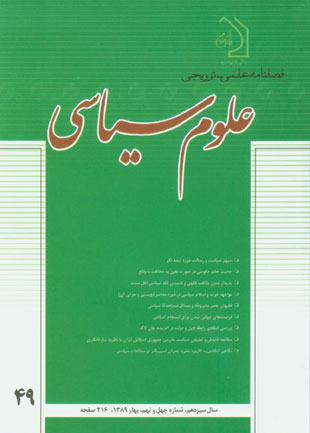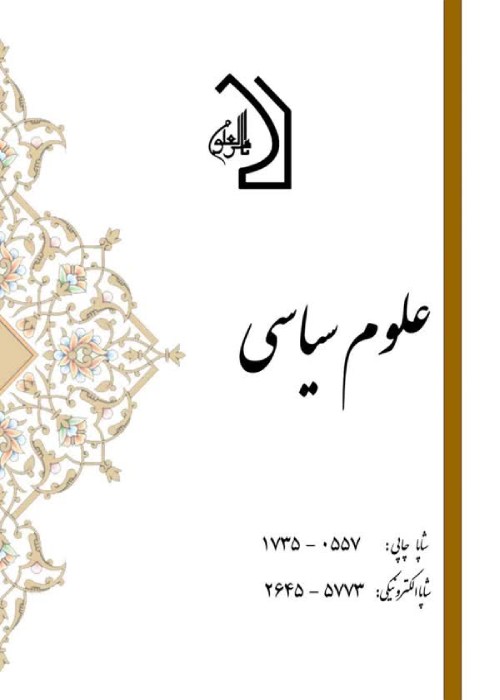فهرست مطالب

نشریه علوم سیاسی
سال سیزدهم شماره 1 (پیاپی 49، بهار 1389)
- 216 صفحه، بهای روی جلد: 15,000ريال
- تاریخ انتشار: 1389/08/25
- تعداد عناوین: 10
-
- سرمقاله
-
سپهر سیاست و رسالت حوزه آینده نگرصفحه 7
- مقالات
-
حجیت حکم حکومتی در صورت یقین به مخالفت با واقعصفحه 13
-
پدیدار شدن مذاهب فقهی و تاسیس فقه سیاسی اهل سنتصفحه 37در این نوشتار چگونگی شکلگیری مذاهب فقهی و فقه سیاسی در سده های دوم و سوم هجری مورد بررسی قرار میگیرد. از دیدگاه نوشتار حاضر پیش فرضها و نگرشهای متفاوت فقهای این عصر به منابع، قواعد و چگونگی استنباط احکام سبب شد تا مذاهب فقهی گوناگونی شکل گیرند. برداشتهای کلامی و دیدگاه پایهگذاران این مذاهب در مورد نسبت رای و حدیث با یافته های انسانی و داده های متنی وحیانی در این امر تاثیر داشت. این مقاله به دنبال آن است تا ضمن ارائه گزارشی از این مذاهب، تفاوتهای آنها را برجسته سازد و چگونگی پدیدار شدن رویکرد فقهی به مسائل سیاسی در میان اهل سنت را تحلیل کند.
کلیدواژگان: فقه، فقه سیاسی، رای، حدیث، اجتهاد، متنگرایی، گذشتهگرایی، حکومت، خراج -
مواجهه غرب و اسلام سیاسی در دوره معاصر (چیستی و چرایی آن)صفحه 65نوشته حاضر درصدد بررسی و تحلیل مواجهه غرب و گفتمان اسلام سیاسی در دوره معاصر است. نخست با تحلیل سویه های فعال سازی اسلام سیاسی می توان دریافت که چالش های غرب و اسلام سیاسی مبتنی بر عناصر و نشانه های استراتژیک هویتی و تمدنی در ساحت عمل است. از این رو کلید ایجاد تفاهم و یا هرگونه خصومت، نخست در فهم بنیان های معرفتی و هویتی است تا از طریق شناخت صحیح و یافتن اصول و شاخص های مشترک تمدنی، راه های نزدیکی به هم جهت رفع چالش ها فراهم گردد. بر این اساس، مقاله حاضر با ذکر دلایل هراس غرب از اسلام سیاسی و چگونگی واکنش آنها در ساحت تمدنی به تحلیل این رویارویی در دوره کنونی می پردازد.
کلیدواژگان: هژمونی، اسلام سیاسی، غرب، غیریت سازی، اسلام ستیزی -
فقی هان عصر مشروطه و مسائل مستحدثه سیاسیصفحه 95فقهای عصر مشروطه که نقش فعالی در نهضت عدالت خواهی و مقید کردن سلاطین به رعایت قانون داشتند، در هنگام مواجهه با موضوعات جدید سیاسی به بررسی هر یک از آنها پرداخته و مواضع متفاوتی در قبال آنها اتخاذ کردند. برخی آنها را منطبق بر موازین شرع و بعضی مخالف شرع و بدعت شمردند. برخی هم به بازسازی و منطبق ساختن آنها با موازین و احکام شرع پرداختند.
نوشتار حاضر متکفل تبیین مواضع متفاوت فقها با موضوعات مستحدثه سیاسی عصر مشروطه همچون تدوین قانون اساسی، تشکیل مجلس شورای ملی، آزادی، مساوات، رای اکثریت و انتخابات و بررسی علل و عوامل آن است.
کلیدواژگان: مشروطه، مسائل مستحدثه سیاسی، مجلس قانون گذاری، تدوین قانون اساسی، آزادی، مساوات -
فرصت های جهانی شدن برای انسجام اسلامیصفحه 129مقاله حاضر درصدد بررسی فرصت های جهانی شدن برای انسجام اسلامی با توجه به روش و الگوی تحلیل گفتمانی است.
جهانی شدن در کنار چالش های فراوان، برای انسجام اسلامی فرصت های قابل توجهی نیز برای مسلمانان از جهت وحدت گرایی آنان ایجاد می کند. گفتمان اسلام با محتوای ذاتی غنی خود و جهان گرا بودن و گفتمان غرب با غیریت سازی از اسلام، مسلمانان را به یکدیگر نزدیک نموده است از این رو، غیریت سازی غرب از مسلمانان می تواند منجر به وحدت مسلمانان در مقابل خطر مشترک شودکلیدواژگان: انسجام اسلامی، جهانی شدن، تحلیل گفتمانی، غیریت سازی -
بررسی انتقادی رابطه دین و دولت در اندیشه جان لاکصفحه 149یکی از چالش های فکری آشکار میان تفکر غالب در اندیشه اسلامی از یکطرف و تفکر سیاسی غالب در غرب مدرن – یعنی لیبرالیسم – از طرف دیگر چگونگی تبیین رابطه دین و دولت است. جان لاک از جمله اصلی ترین پایه گذران لیبرالیسم است که مستقلا به این موضوع توجه کرده است و سعی دارد در این رابطه استدلال هایی را ارائه دهد. این مقاله در صدد است با تکیه بر کتاب «نامه ای در باب تساهل» ضمن تشریح دیدگاه او در این باب آنرا به بوته نقد بسپارد.
کلیدواژگان: جان لاک، فلسفه سیاسی، تساهل، رابطه دین و دولت -
مطالعه تحلیلی و تطبیقی سیاست خارجی جمهوری اسلامی ایران با نظریه سازه انگاریصفحه 163مقاله حاضر به دنبال کاربست نظریه ای از میان چارچوب های نظری و رهیافت های معروف است تا بتواند به مطالعه روش مند و گویایی از سیاست خارجی جمهوری اسلامی ایران پرداخته و در پردازش بهتر و منسجم تر ادراکات آن در قیاس با متغیرهای دیگر مثمر ثمر باشد. برای این منظور ابتدا به اجمال، تطورات تاریخی پارادایم ها و نظریه های روابط بین الملل، به ویژه «رئالیسم» به عنوان نظریه غالب مورد اشاره قرار گرفته، سپس درباره فلسفه انتخاب رهیافت «سازه انگاری» برای تحلیل سیاست خارجی جمهوری اسلامی ایران احتجاج می شود. همچنین از رهگذر مروری بر مبانی معرفت شناختی، هستی شناختی و انسان شناختی و اصول این نظریه در سیاست خارجی، دلالت ها و جنبه های تطبیقی و در پایان، گزاره های تجویزی آن درباره سیاست خارجی ایران نیز مورد توجه قرار می گیرد.
کلیدواژگان: سیاست خارجی جمهوری اسلامی ایران، روابط بین الملل، سازه انگاری - نقد و معرفی
-
نگاهی انتقادی به کاربرد نظریه بحران اسپریگنز در مطالعات سیاسیصفحه 187نظریه بحران اسپریگنز به مثابه یکی از مهم ترین روش های فهم اندیشه سیاسی، دارای چهار مرحله است: مشاهده و شناسایی مشکل، تحلیل و جست وجو در خصوص علل بحران، بازسازی آرمانی جامعه سیاسی، و بالاخره ارائه درمان. در کاربرد این نظریه حداقل می بایست به شش مسئله (یا شرط) توجه نمود: تفاوت ارتباط اندیشه و زمانه با نظریه بحران، انسجام نظریه سیاسی، اثبات ارتباط نظریه سیاسی (منسجم) با بحران زمانه، زمینه گرا بودن اندیشمند، مسئله نسبی گرایی و تفاوت نظریه بحران با جامعه شناسی معرفت.
کلیدواژگان: نظریه بحران، جامعه شناسی، معرفت نظریه سیاسی، زمینه گرایی، متن گرایی، نسبی گرایی -
چکیده مقالات به زبان عربیصفحه 196
-
The incumbentness of governmental verdicts in case of certainty of their contradiction to realityPage 13Studying governmental verdicts issued by jurisprudents is an important subject in political Fiqh. An important question about governmental verdict is that if one is certain that a governmental verdict issued by a jurisprudent in contradictory to reality, is the verdict incumbent on him / her or not. On the basis of the person’s certainty and the reality, there might be four possibilities:certainty of contradiction to axioms of religion,certainty of contradiction to axioms of Fiqh,certainty of contradiction to an obligatory minor verdict,certainty of contradiction to expediency of the Islamic society.The incumbentness of governmental verdict is studied in regard with these four possibilities. The important one is the fourth. The jurisprudent’s verdict is incumbent because of to the jurisprudent’s being the most knowledgeable of governmental Fiqh, the supervision of expert jurisprudents on the process of issuing verdict, and the executive sovereignty of the jurisprudent in the society. As a result, if a person is certain of the contradiction of a governmental verdict to expediency, his certainty has no social value and his governmental verdict is incumbent because of his executive sovereignty. Others may only have scientific sovereignty, but obedience in the realm of social behavior only belongs to jurisprudents.
-
The formation of jurisprudential and political Fiqh schools in SunnismPage 37This paper is to study how jurisprudential and political Fiqh schools were formed during the 2nd and 3rd century (AH). The different attitudes and assumptions of the jurisprudents in that age towards sources and process of deciphering verdicts led to the formation of various jurisprudential schools. Theological understandings and the views of the founders of these schools towards the relationship between and vote and hadiths, or human achievements and divine textual data were much influential on this issue. This paper is to, after presenting a brief overview of these schools, elaborate on their differences and analyze how jurisprudential approaches to political issues were formed among the Sunnite scholars.
-
The nature and reasons of the West's confrontation with the political Islam in the contemporary eraPage 65The present paper is to study and analyze the West's confrontation with political Islam discourse in the contemporary period. First, on the basis of an analysis of the features of the activation of political Islam, one can find out that the challenges between Islam and the West are based on strategic elements and signs of identity and civilization in practice. Thus, the key to mutual understanding and or any kind of antagonism is achieved through a true knowledge and finding common principles and characteristics, and ways of intimacy to remove challenges. As a result, mentioning the reasons behind the fear of the West from political Islam and the manners of their reaction at the level of civilization, the present paper embarks on the analysis of this confrontation in the present era.
-
The jurisprudents in Constitutionalist period Iran and the political problemsPage 95Having an active role in justice-seeking movement and in making the kings to observe laws, the jurisprudents in the constitutionalist period Iran, when facing with new political issues, studied these issues and each adopted different positions in regard with them. Some considered them in accordance with religious laws and some against them. Others also tried to adapt them to religious laws. The present paper is to explain the different political positions adopted by jurisprudents during the constitutionalist period Iran in regard with new political issues such as the codification of constitution, formation of national majlis, freedom, equality, majority vote, election, and its causes.
-
Globalization: an opportunity for the Islamic unificationPage 129On the basis of discourse analysis, this paper is to show how globalization can provide an opportunity for the Islamic world to unify. Although globalization may result in many challenges for the Islamic unity, it may create considerable opportunities for the Muslim's unification. Due to the universalistic character of the Islamic discourse, the West's antagonistic relationship to Islam has resulted in the unity of Muslims'. Thus, the West's antagonistic attitude towards Muslims has resulted in the Muslim's unification against a common enemy, i.e. the West.
-
A critical study of the relationship between religion and state in John Locke's ideasPage 149An important intellectual challenge between the dominant Islamic thought, on one side, and the dominant political thought in the modern West, i.e. liberalism, on the other side, is the relationship between religion and state. John Locke is one of the major founders of liberalism who was interested in liberalism and tried to propose arguments for it. Based on Locke’s “A Letter Concerning Toleration”, the present paper is to critically evaluate his ideas in this regard.
-
An analytical and comparative study of Islamic Republic of Iran's foreign policy on the basisPage 163On the basis of a constructionist approach, the present paper is to systematically study the foreign policy of the Islamic Republic of Iran’s to produce a better and more cohesive understanding of its variables as compared to others. First, dominant theories of international relations, with an emphasis on realism, are briefly surveyed, then, it is explained why constructionism is adopted as framework to analyze the foreign policy of the Islamic Republic of Iran. Finally, through an elaboration on the epistemological, ontological, and humanistic foundations of theory in foreign policy, the prescriptive implications of the theory for the foreign policy of Islamic Republic of Iran are proposed
-
A critical approach to the application of Spragens crisis theory in political studiesPage 187Spragens crisis theory, as one of the most important methods of political thought, has four stages: identifying and observing the problem, finding and analyzing the causes of the crisis, ideally reconstructing the political society, and finally proposing solution. To apply this theory, at least six requirements should be brought into consideration: the difference between the relationship between thought and time with crisis theory, cohesion of political theory, proving that political theory and the existing crisis are related, contextualism of the scholar, relativism and the difference between crisis theory and the sociology of knowledge.


